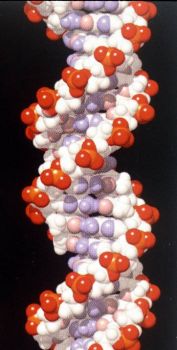Genetic cause uncovered for extreme form of dwarfism
By: Alison Field
Last updated: Monday, 28 February 2011

Model of DNA
Two Sussex scientists have identified a gene that causes an extreme form of dwarfism, known as primordial dwarfism.
The findings, published on Sunday (27 February) in Nature Genetics, shed light on how human body size is determined, and for the first time make a direct link between the copying of DNA in cells and body growth.
Dr Mark O'Driscoll and Professor Penny Jeggo at the Sussex Genome Damage and Stability Centre, together with a colleague at the MRC Human Genetics Unit in Edinburgh, reveal that the gene ORC1 plays a key role in triggering the copying of DNA.
This discovery could open up new avenues of research into how growth disorders occur and offer people with severe growth disorders a chance of better and earlier diagnosis.
Primordial dwarfism is a group of incredibly rare growth disorders that significantly limits growth at every stage of life, from before birth to adulthood, and includes the smallest people in the world (with an adult height of as little as one metre).
Many of those with primordial dwarfism have small ears and no knee caps. They may also have a reduced head size, in proportion to their body size, in contrast with other forms of dwarfism.
Without a clear understanding of what causes the disorders, it can often be difficult for patients to get an accurate diagnosis and to provide the best management of their condition.
Professor Jeggo says: "It's exciting that a protein complex that plays a key role in how cells copy their DNA has such a significant impact on development.
"This demonstrates that the investment in understanding basic mechanisms underlying cell growth and replication is critical for understanding development of organisms and disorders of human health."
The findings are supported by a second study, by a team at the MRC Human Genetics Unit in conjunction with Radboud University Nijmegen Medical Centre in the Netherlands.
The second study reveals that four further genes also cause primordial dwarfism, suggesting that these genes are important for human growth.

